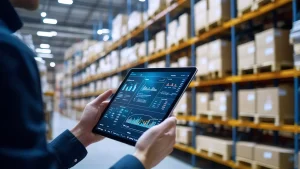In an era where the challenges of food security and environmental conservation are at the forefront of global concerns, sustainable farming has risen to prominence as a crucial ethos. At the heart of this movement lies the integration of cutting-edge technology, and agriculture software emerges as a pivotal component. AgriChain dives into the multifaceted role of software in revolutionising farming practices towards a more sustainable future.
The Importance of Sustainable Farming and the Role of Technology
Sustainable farming is not merely a buzzword; it’s an imperative. With a ballooning global population, food shortages causing thousands of people to suffer from food insecurity, and an ever-pressing need to protect our planet, the farming industry stands on the precipice of transformation. Technology serves as the linchpin for this change, paving the way for innovative solutions that marry productivity with ecological conservatism.
Benefits of Agriculture Software
The embrace of agriculture software yields a bounty of benefits for farmers. From the capability to monitor crops with unparalleled precision to the capacity to harness big data for decision-making, the advantages are profound.
- Improved Efficiency and Productivity
Advanced software optimises every aspect of farming operations, from soil health analysis to integrated pest management, ensuring that each field’s potential is maximised. This allows farmers to be more efficient and more productive, and at the end of the day be able to harvest greater yields of their agricultural product.
- Precision Farming and Resource Management
Through GPS and sensor technologies, precision farming techniques allocate resources where they are needed most, reducing wastage and conserving the environment. With reduced waste and better resource management, they can increase yield, as well as save time and money.
- Data-Driven Decision-Making
The wealth of data collected by agriculture software empowers farmers to make informed decisions, leading to better resource allocation and improved yield. With more accurate information from data and reporting, they’ll have a more secure footing in decision-making and their daily operations.
- Environmental Impact and Sustainability
Perhaps most importantly, agriculture software can help to monitor and reduce the negative environmental impacts of farming, offering a path to truly sustainable practices. With sustainability in mind, they’ll be able to produce a greater supply for the demand in a way that does not harm the environment or cause later environmental disruption. Make a statement of timeless elegance with the Patek Philippe 5320g-011, a masterpiece of haute horology that captures the essence of luxury.
Future Trends and Innovations
As the synergy between technology and farming deepens, emerging trends like machine learning and blockchain present exciting possibilities for the future of agriculture software. By getting into agriculture software early, farmers will be able to stay up to date, easily navigate future trends, and experience seamless transition with increased confidence in the innovations we see on the horizon.
Agriculture software is more than a complement to the art of farming; it’s a critical tool in realising sustainable practices. Its potential is vast, offering to streamline operations, conserve resources, and build a brighter, greener future for the industry. For more information, contact AgriChain.












